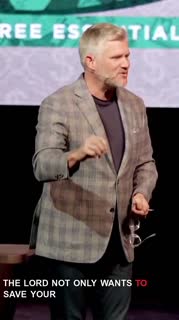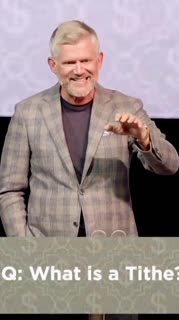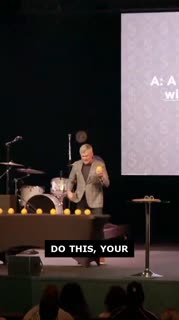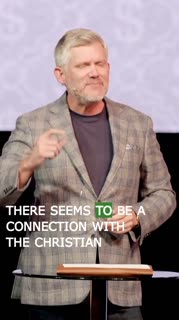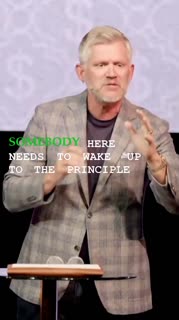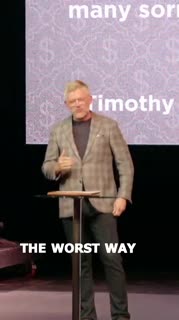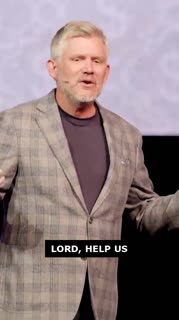Stewardship and Generosity: Advancing God's Kingdom Together
Devotional
Sermon Summary
Bible Study Guide
Sermon Clips
1. "You know, when you give here, when you invest in the kingdom of God, the investment is diversified and blesses all kind of people. Come on. Are you partnering with us? If not, why not? You know, this is good soil. You know, as you leave today, there's gonna be giving boxes or you can scan the QR code on the screen or you can do like most of us, just download our app and you can give that way. Thanks again. And remember, together, let's keep facilitating miracles." [30:14] (30 seconds)
2. "The Lord not only wants to save your soul, God wants to save your life. He wants to save your life. He wants to help us in our practical lives and where we live." [33:19] (11 seconds)
3. "A tithe is when we, it's all about worship, and it's all about honor. It's when we honor God with the first tenth. of any financial income. We honor God with the first tenth of any financial income." [36:51] (17 seconds)
4. "If you do this, your 90 % will go further with me than 100 % by yourself. That's the tithe. That's the tithe. Lord, I'm worshiping in you first and foremost." [36:51] (20 seconds)
5. "There seems to be a connection with the Christian faith, with the scriptures, with those who take them seriously, not just hear about them, but actually put them into practice that does not limit our ability to make wealth, but actually attracts it." [37:58] (17 seconds)
6. "Somebody here needs to wake up to the principle that, that God's way is better. It's always better, and it will result in blessing in our lives." [41:46] (12 seconds)
7. "It's been said the worst way to help the poor is to be poor. And it's, it's, I want to say time it. It's, it's long overdue. The enemy's keeping you just living from week to week. That, that, that season I say in Jesus name is coming to an end." [50:53] (20 seconds)
8. "Imagine for a moment, all the good that could be done in the world. If wealth, if resources were in the hands of passionate, dependable, godly men and women. Passionate. Church isn't an option for me. Faith isn't an option for me. In fact, I bring my faith into where I work." [52:11] (26 seconds)
9. "Whatever you do, come on. Don't say whatever you do, whatever you do, work at it with all of your heart. By the way, I just want to say this in passing work, um, our vocation, uh, what we do for a living, uh, that's not a part of the curse." [01:01:11] (16 seconds)
10. "Lord, help us to wake up to who we are. Lord, help someone wake up to their full potential. I'm tired of living at this place. Maybe there's a better way." [01:06:57] (16 seconds)
Ask a question about this sermon
2. "The Lord not only wants to save your soul, God wants to save your life. He wants to save your life. He wants to help us in our practical lives and where we live." [33:19] (11 seconds)
3. "A tithe is when we, it's all about worship, and it's all about honor. It's when we honor God with the first tenth. of any financial income. We honor God with the first tenth of any financial income." [36:51] (17 seconds)
4. "If you do this, your 90 % will go further with me than 100 % by yourself. That's the tithe. That's the tithe. Lord, I'm worshiping in you first and foremost." [36:51] (20 seconds)
5. "There seems to be a connection with the Christian faith, with the scriptures, with those who take them seriously, not just hear about them, but actually put them into practice that does not limit our ability to make wealth, but actually attracts it." [37:58] (17 seconds)
6. "Somebody here needs to wake up to the principle that, that God's way is better. It's always better, and it will result in blessing in our lives." [41:46] (12 seconds)
7. "It's been said the worst way to help the poor is to be poor. And it's, it's, I want to say time it. It's, it's long overdue. The enemy's keeping you just living from week to week. That, that, that season I say in Jesus name is coming to an end." [50:53] (20 seconds)
8. "Imagine for a moment, all the good that could be done in the world. If wealth, if resources were in the hands of passionate, dependable, godly men and women. Passionate. Church isn't an option for me. Faith isn't an option for me. In fact, I bring my faith into where I work." [52:11] (26 seconds)
9. "Whatever you do, come on. Don't say whatever you do, whatever you do, work at it with all of your heart. By the way, I just want to say this in passing work, um, our vocation, uh, what we do for a living, uh, that's not a part of the curse." [01:01:11] (16 seconds)
10. "Lord, help us to wake up to who we are. Lord, help someone wake up to their full potential. I'm tired of living at this place. Maybe there's a better way." [01:06:57] (16 seconds)

